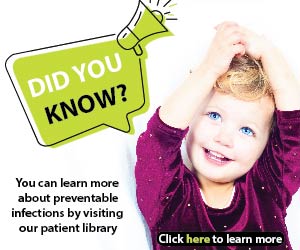Travel Safely: Get Immunized

Planning a trip?
When you set out on your travels, your biggest concern should be planning how to enjoy yourself when you reach your destination. The last thing you want to worry about is catching an infectious disease – both while you’re away from home and after you return.
Knowing that you and your family have the right vaccinations can help ensure that you return just as healthy as you left.
Vaccination needs will be determined by destination, what activities you have planned, your age, health status, and your immunization history.1
What can I do to prepare for my trip?
- Plan to visit your healthcare provider or travel health clinic at least six weeks before you travel, to ensure that you have time to receive all the doses of the vaccinations you need.
- Discuss any health-related concerns related to your trip with your physician.
- Obtain travel health insurance.1
- For information on specific diseases and health conditions that may exist at your planned destination, check Travel Health Notices.2
Don’t assume that contagious diseases currently considered relatively rare can’t make a comeback and infect people in greater numbers. In fact, increased rates of several vaccine-preventable infectious diseases, including measles, polio, and tuberculosis (TB) have made the news and travel advisories in the past year.2 Confirm that your family’s vaccinations are up to date, and get any recommended booster doses you need.
Did you know?
Hepatitis B is one of the most common vaccine-preventable diseases to affect travellers. Transmitted by exposure to infected blood and body fluids (including semen and vaginal fluid), hepatitis B is highly contagious, and easily prevented by immunization.3
What vaccines might be needed if…?
…I am travelling to a destination outside of North America.
Widespread vaccination programs have made several communicable diseases relatively rare in Canada. Some of these, such as diphtheria, polio, measles, and rubella may occur at much higher rates in countries where vaccination is not widely adopted.2
Some countries require proof that you have received a yellow fever (an increased risk recently in some regions) and/or meningococcal vaccination, so check the requirements for your destination.4
…I am staying at rustic lodgings that are off the beaten track.
People travelling to rural areas or places with inadequate sanitary facilities should consider vaccination against hepatitis A (HA), which is recommended for all travellers to developing countries. An oral vaccine against cholera /travellers’ diarrhea is also available for those at risk, such as people with chronic illnesses for whom there is an increased risk of serious consequences from travellers’ diarrhea.5
And every traveller should also be fully vaccinated against tetanus. Exposure to spores can occur with any form of injury in which the skin is broken, from a simple cut to a car accident.4
…I am attending a large event or visiting tourist attractions that will gather crowds.
You may be at greater risk of catching illnesses that are transmitted by airborne germs including measles, mumps, meningitis, diphtheria and pertussis (whooping cough), in large gatherings of people.4
…I am travelling with a young child.
Children are at higher risk of infection with meningococcal disease, hepatitis A, typhoid, and rabies. Primary vaccinations can be given on an accelerated schedule to infants before they travel, and pneumococcal conjugate vaccine may be started at 6 weeks of age. The oral rotavirus vaccine can be given at the same time. Children travelling outside of North America should also be given their first dose of measles-mumps-rubella vaccine (MMR), if they have not yet received it.6
What vaccinations might I require?
The following is an alphabetical list of diseases against which vaccination may be recommended prior to travel:1
- chicken pox
- chikungunya
- cholera
- diphtheria
- German measles (rubella)
- flu (influenza)
- Haemophilus influenzae type b disease (Hib)
- hepatitis A
- hepatitis B
- human papillomavirus (HPV)
- Japanese encephalitis
- measles
- meningococcal disease
- mumps
- pneumococcal disease
- polio
- rabies
- tetanus
- tick-borne encephalitis
- typhoid fever
- whooping cough (pertussis)
- yellow fever
For destination-specific suggested and mandatory vaccines, visit https://travel.gc.ca/travelling/health-safety/vaccines.
Brought to you by Vaccines411.ca – know where to go for your vaccinations.
This information should not be used as a substitute for the medical care and advice of your doctor. There may be variations in treatment that your physician may recommend based on individual facts and circumstances.
Read more Vaccines411® Articles 
Sources
Note: the hyperlinks that direct to other sites are not continuously updated. It is possible that some links become untraceable over time. Thank you.
- Government of Canada. Well on Your Way - A Canadian’s Guide to Healthy Travel Abroad.
http://travel.gc.ca/travelling/publications/well-on-your-way - Government of Canada. Travel Related Diseases.
https://travel.gc.ca/travelling/health-safety/travel-health-notices - Government of Canada. Hepatitis B.
https://travel.gc.ca/travelling/health-safety/diseases/hepatitis-b - World Health Organization (WHO): CHAPTER 6. Vaccine-preventable diseases and vaccines.
https://www.who.int/ith/ITH-Chapter6.pdf - Canada Communicable Disease Report 2005: Volume 31 > Statement on New Oral Cholera and Travellers’ Diarrhea Vaccination.
https://www.canada.ca/content/dam/phac-aspc/migration/phac-aspc/publicat/ccdr-rmtc/05pdf/acs-dcc3107.pdf - Public Health Agency of Canada. Canadian Immunization Guide, Part 3: Vaccination of Specific Populations.
http://www.phac-aspc.gc.ca/publicat/cig-gci/p03-10-eng.php



